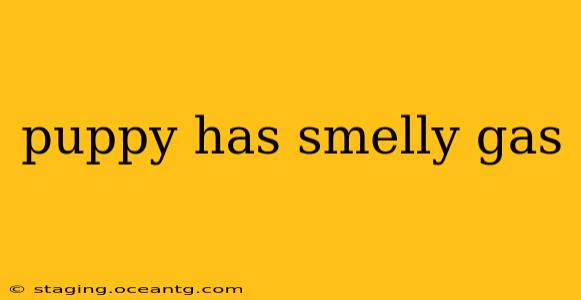Dealing with a puppy is a joyous experience, filled with playful antics and unconditional love. However, one less-than-pleasant aspect of puppy parenthood is the occasional (or, let's be honest, sometimes frequent) bout of smelly gas. While a little gas is normal, excessively smelly or frequent flatulence in your puppy can indicate an underlying issue. This comprehensive guide will explore the common causes, preventative measures, and when it's time to seek professional veterinary help.
What Causes Smelly Gas in Puppies?
Several factors can contribute to your puppy's pungent emissions. Understanding these causes is the first step towards addressing the problem.
-
Diet: This is often the primary culprit. Puppies, with their still-developing digestive systems, can react poorly to certain ingredients. Common offenders include:
- High-fat foods: Fatty treats or table scraps can lead to increased gas production.
- Difficult-to-digest ingredients: Certain grains, beans, and fillers in low-quality dog foods can be hard for puppies to process.
- Changes in diet: Introducing new foods too quickly can upset their delicate digestive balance.
- Food allergies: Just like humans, puppies can develop allergies to certain proteins (like beef, chicken, or dairy) leading to gas and other digestive issues.
-
Intestinal Bacteria Imbalance: A healthy gut microbiome is crucial for proper digestion. An imbalance, often referred to as dysbiosis, can result in increased gas production and foul odors. This can be triggered by diet changes, stress, or illness.
-
Ingestion of Non-Food Items: Puppies are notorious for exploring their world with their mouths. Ingesting things they shouldn't (like trash, grass, or toys) can lead to gas and digestive upset.
-
Parasites: Internal parasites like worms can cause digestive problems, including increased gas. Regular fecal exams are crucial for early detection and treatment.
-
Underlying Medical Conditions: In some cases, smelly gas can be a symptom of a more serious health problem, such as inflammatory bowel disease (IBD), pancreatitis, or exocrine pancreatic insufficiency (EPI).
How Can I Prevent My Puppy From Having Smelly Gas?
Prevention is key! Here's what you can do to minimize your puppy's gaseous emissions:
-
High-Quality Food: Choose a puppy food formulated with easily digestible ingredients, and ideally, one that specifies it's designed for sensitive stomachs. Read labels carefully!
-
Gradual Food Transitions: When switching food, do so gradually over 7-10 days, mixing the old food with the new to avoid upsetting your puppy’s gut.
-
Avoid Table Scraps and Treats: Stick to approved puppy treats and avoid giving your puppy human food.
-
Consistent Feeding Schedule: Regular meal times help regulate your puppy's digestion.
-
Fresh Water: Ensure your puppy always has access to clean, fresh water.
-
Regular Exercise: Physical activity helps with digestion and reduces gas buildup.
-
Regular Vet Check-ups: Routine vet visits, including fecal exams, are essential for early detection and treatment of any underlying medical conditions.
When Should I Worry About My Puppy's Gas?
While occasional gas is normal, consult your veterinarian if:
-
The gas is excessively foul-smelling or frequent.
-
Your puppy exhibits other symptoms alongside the gas, such as vomiting, diarrhea, lethargy, loss of appetite, or weight loss.
-
The gas persists despite dietary changes.
-
Your puppy is straining to defecate.
What if My Puppy's Gas is Caused by a Medical Condition?
Your vet will conduct a thorough examination, possibly including blood tests and stool samples, to determine the underlying cause. Depending on the diagnosis, treatment may involve medication, dietary changes, or other interventions.
Remember, consistent observation and prompt veterinary care are crucial in addressing your puppy's smelly gas and ensuring their overall health and well-being. A healthy, happy puppy is a gas-free (or at least, less gassy) puppy!
